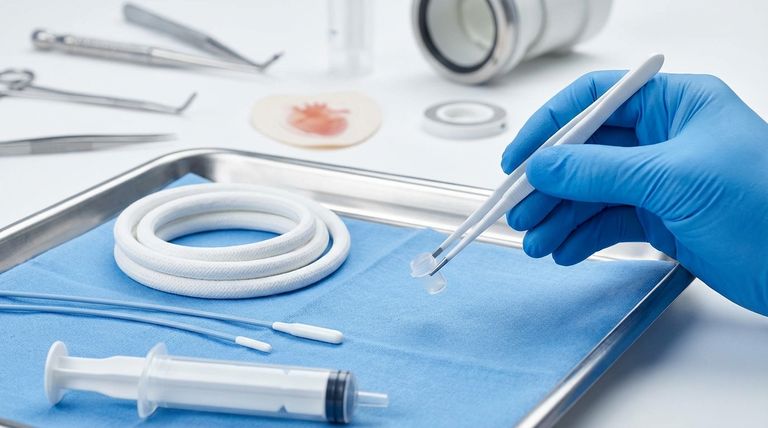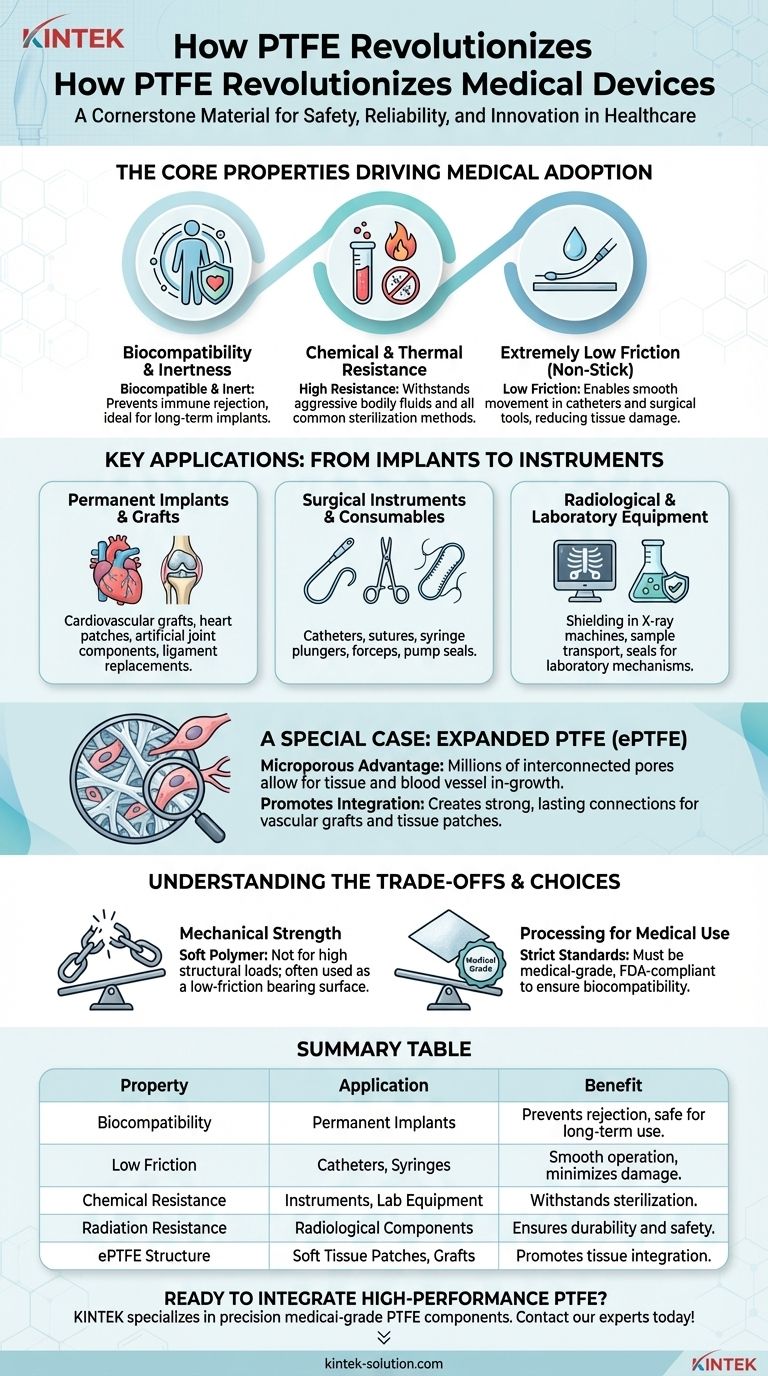In the medical field, PTFE is a cornerstone material used for its unique combination of properties. It is found in long-term implants like cardiovascular grafts and heart patches, in disposable instruments like catheters and sutures, and as critical components in laboratory and radiological equipment. Its adoption is driven by its exceptional biocompatibility and chemical inertness.
The core reason for PTFE's widespread medical use is its profound biological inertness. The human body does not recognize it as a foreign substance, which, combined with its chemical resistance and low-friction surface, makes it one of the safest and most reliable materials for both internal and external medical devices.

The Core Properties Driving Medical Adoption
To understand PTFE's role in medicine, we must first examine the fundamental properties that make it so uniquely suitable for the human body and sterile environments.
Unmatched Biocompatibility and Inertness
Polytetrafluoroethylene (PTFE) is exceptionally biocompatible, meaning it does not cause an adverse or toxic reaction when exposed to the body's tissues.
This biological inertness prevents the patient's immune system from rejecting the material, making it ideal for permanent implants that must function for years inside the body.
Exceptional Chemical and Thermal Resistance
PTFE is highly resistant to chemicals, including aggressive bodily fluids and sterilization agents.
This resilience means it can be sterilized by any common method without degrading, ensuring the safety and integrity of medical instruments and implants.
Extremely Low Friction (Non-Stick)
The material possesses one of the lowest coefficients of friction of any solid, giving it a "non-stick" quality.
This property is critical for devices like catheters and syringe plungers, where smooth, frictionless movement is necessary to prevent tissue damage and ensure accurate operation.
Key Applications: From Implants to Instruments
These core properties translate into three distinct categories of medical application, each leveraging a different aspect of the material's capabilities.
Permanent Implants and Grafts
PTFE is a trusted material for devices that remain in the body, such as cardiovascular grafts used to replace or bypass blood vessels.
It is also used to create heart patches for repairing defects, components for artificial joints, and even ligament replacements.
Surgical Instruments and Consumables
The material is frequently used for single-use or reusable surgical tools.
Common examples include catheters, which benefit from its low friction, and surgical sutures, valued for their inertness and smooth passage through tissue. It is also found in forceps and seals for pumps.
Radiological and Laboratory Equipment
Due to its high radiation resistance, PTFE is used to manufacture shielding components inside X-ray machines and other radiological equipment.
In laboratory settings, its chemical inertness makes it perfect for sample transport mechanisms and seals, ensuring that samples remain uncontaminated.
A Special Case: Expanded PTFE (ePTFE)
A specific form of this polymer, expanded PTFE (ePTFE), offers unique advantages that have revolutionized certain medical procedures.
The Microporous Advantage
Unlike solid PTFE, ePTFE is processed to have a multi-microporous structure, containing millions of tiny, interconnected pores.
This structure maintains the inertness of PTFE while introducing a new mechanical property that is crucial for integration with the body.
Promoting Tissue Integration
The microporous texture of ePTFE allows the body's own tissue and blood vessels to grow directly into the material.
This in-growth creates a strong, lasting connection between the implant and the surrounding tissue, which is vital for the success of artificial blood vessels and soft tissue regeneration patches.
Understanding the Trade-offs
While its benefits are significant, it is important to recognize PTFE's limitations to ensure it is applied correctly.
Mechanical Strength
PTFE is a soft polymer and does not possess the high mechanical or structural strength of metals like titanium or stainless steel.
In applications like artificial joints, it is typically used as a low-friction bearing surface rather than the primary load-bearing component.
Processing for Medical Use
While the raw material is inert, the manufacturing process for a medical device is critical. Any additives or contaminants introduced during processing can compromise its biocompatibility.
Therefore, only medical-grade PTFE that complies with strict regulatory standards, such as those from the FDA, can be used for these applications.
Making the Right Choice for Your Goal
The decision to use PTFE depends entirely on the specific requirements of the medical device or application.
- If your primary focus is long-term implantation and tissue integration: Expanded PTFE (ePTFE) is the definitive choice for applications like vascular grafts and soft tissue patches.
- If your primary focus is creating smooth, non-reactive device surfaces: Standard PTFE is ideal for catheters, syringe plungers, and protective coatings on surgical instruments.
- If your primary focus is equipment durability and safety: PTFE's resistance to radiation and chemicals makes it a reliable choice for components in radiological and laboratory machines.
Understanding these distinct properties and forms allows you to select this versatile polymer precisely to enhance patient safety and device efficacy.
Summary Table:
| PTFE Property | Medical Application | Benefit |
|---|---|---|
| Biocompatibility & Inertness | Permanent Implants (e.g., vascular grafts) | Prevents immune rejection, safe for long-term use. |
| Low Friction & Non-Stick | Catheters, Syringe Plungers | Smooth operation, minimizes tissue damage. |
| Chemical & Thermal Resistance | Surgical Instruments, Lab Equipment | Withstands aggressive sterilization and chemicals. |
| Radiation Resistance | Radiological Machine Components | Ensures durability and safety in imaging equipment. |
| ePTFE Microporous Structure | Soft Tissue Patches, Grafts | Promotes tissue integration for stronger healing. |
Ready to Integrate High-Performance PTFE into Your Medical Devices?
KINTEK specializes in manufacturing precision PTFE components—from seals and liners to custom labware—for the medical, semiconductor, laboratory, and industrial sectors. Our expertise in custom fabrication ensures your devices benefit from the unmatched biocompatibility and performance of medical-grade PTFE, whether you need prototypes or high-volume production.
Contact our experts today to discuss how our PTFE solutions can enhance the safety and efficacy of your medical applications.
Visual Guide

Related Products
- Custom PTFE Parts Manufacturer for Teflon Parts and PTFE Tweezers
- Custom PTFE Parts Manufacturer for Teflon Containers and Components
- Custom PTFE Measuring Cylinders for Advanced Scientific and Industrial Applications
- Custom PTFE Volumetric Flasks for Advanced Scientific and Industrial Use
- Custom PTFE Teflon Parts Manufacturer PTFE Magnetic Stirring Bar
People Also Ask
- What are the key advantages of PTFE? Unmatched Performance for Extreme Environments
- What are the main advantages of using PTFE parts in industrial applications? Unlock Unmatched Chemical Resistance and Reliability
- What industries use PTFE machined parts and for what applications? Critical Components for Demanding Environments
- Why is CNC machining preferred for Teflon parts over other methods? Unlock Precision & Complex Designs
- What are the best practices for achieving tight tolerances in Teflon (PTFE) machining? Master Precision for Demanding Applications



















